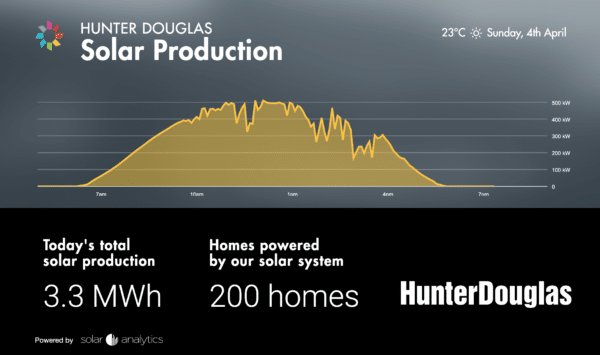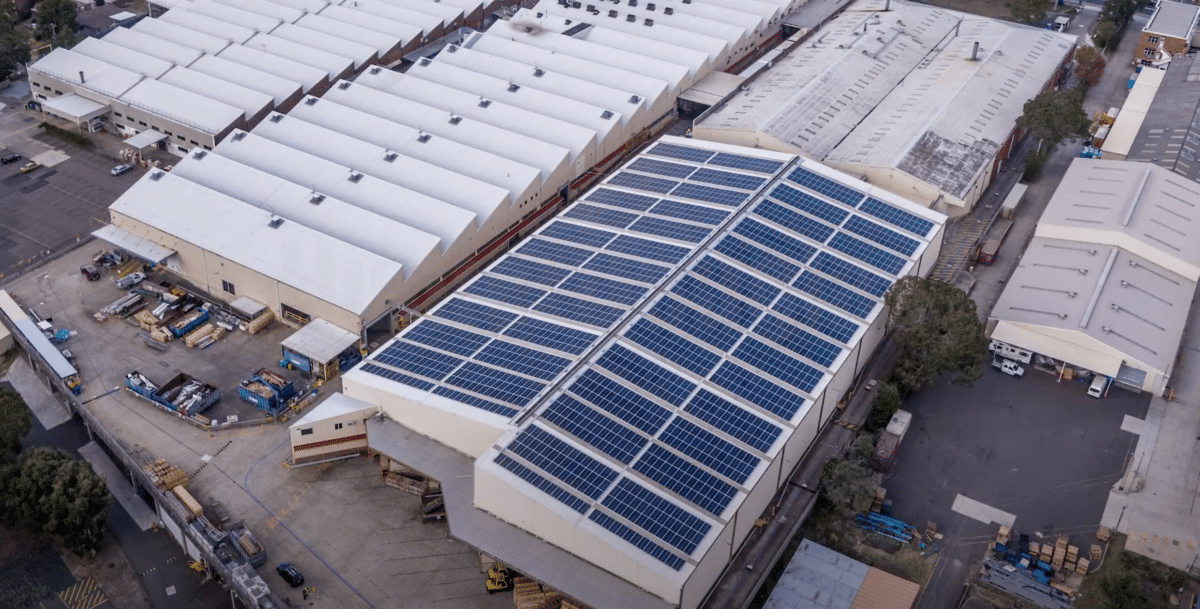A company with a mission to mitigate the harsh effects of the sun and improve the energy efficiency of buildings will soon make the excess electricity generated by its commercial rooftop solar system available at a discount to employees. This new perk of working at the Sydney factory premises of Hunter Douglas, a supplier of blinds and window awnings, is believed to be an Australian first in terms of direct renewable energy trading between a company and its workers.
In mid-2018, the large roof of international company Hunter Douglas’s main Australian warehouse was blanketed with 800 kW of solar panels, as part of the firm’s commitment to sustainability.
“Everything we do is designed to grow our business and our customers’ business and contribute to a more sustainable world,” says the Hunter Douglas website.
The company’s advanced window treatments, using innovative materials and often automated systems, have long been designed to reduce energy loss in homes and offices, helping to save on heating and cooling costs and create more comfortable environments.
The installation of 2080 solar panels on its Rydalmere factory was intended, it says, “to support the local economy, continuing our investment in Australian manufacturing”.
Over time, Hunter Douglas recognised that it could also benefit its employees by offering a reduced rate on excess energy it was exporting to the grid on weekends and on summer evenings after 4pm, when the facility is closed.

Image: Hunter Douglas/Solar Analytics
Enosi algorithms match power use with generation source
The sharing concept was realised using the energy traceability platform developed by technology innovator Enosi, and a new contract for energy supply offered by Simply Energy, the Australian retail arm of French energy giant Engie.
Enosi’s Powertracer allows energy consumers to choose the source of their energy — whether it be one or more solar or wind farms, or in this case, a rooftop solar installation. Using smart metering data, it traces, matches and settles energy production and consumption at half-hour intervals, so consumers can see exactly where their energy is coming from at any given time, and how much they’re saving by dealing direct.
To take advantage of the 5 cents per kilowatt hour discount offered by Hunter Douglas, employees must have a smart meter, and be willing to sign up for electricity supply with Simply Energy.
Benefits all ’round
Hunter Douglas gets the same return on the power as it would from selling it to the grid, which enables it to keep seeing returns on its solar investment.
For employees who perhaps can’t afford to install solar on their own roofs, or who live in rented homes, it means they can source a good proportion of their energy from renewable generation, at some of the lowest energy prices available in New South Wales.
Enosi entered the market in December last year, after having been mentored from startup to commercial viability by the principals of Energy Estate via the renewable energy project developer’s new incubator structure, EnergyGrowth.
One of Enosi’s first applications is The Beehive Project, for which Enova Community Energy is using Powertracer to enable a Hunter Valley community to share a Tesla battery energy storage system. The shared BESS will allow each homeowner to get more out of their rooftop solar without investing in their own battery, while Powertracer accounts for each participant’s use of the joint storage facility.
Enosi’s system “gives consumers power” over their choice of energy provider, Vincent Dwyer, Principal of Energy Estate, told pv magazine Australia last year.
At the same time, it allows businesses such as Hunter Douglas to create a sense of community among their employees by spreading the benefits of their investment in solar.
Creating clear demand for new solar and wind projects
“We believe the public should have direct access to cleaner, cheaper energy enabled by the Enosi platform, and that new wind and solar investments will be made to serve this new market,” say Enosi’s founders.
Through energy retailers such as Simply Energy and Energy Locals partnership with Powertracer, Enosi reckons households and businesses can today source 70% of their energy directly from renewables (for the time being, the remainder is sourced by the retailer from the grid).
Over time, it says, “we will introduce more and more wind and solar” generators to the platform, and probably also partner with battery energy storage providers to ultimately provide 100% clean energy matching at a lower cost than is available through the grid.
In response to the energy crisis of the late 1970s, Hunter Douglas developed its Duette Honeycomb Shades, which trap air in their cell construction to keep homes warmer in winter and cooler in summer.
In response to the 21s century climate crisis, Enosi is making renewable energy directly accessible to consumers and enabling companies like Hunter Douglas to achieve True Zero if they choose to, while providing their partners and employees first-of-a-kind energy benefits.
This content is protected by copyright and may not be reused. If you want to cooperate with us and would like to reuse some of our content, please contact: editors@pv-magazine.com.









2 comments
By submitting this form you agree to pv magazine using your data for the purposes of publishing your comment.
Your personal data will only be disclosed or otherwise transmitted to third parties for the purposes of spam filtering or if this is necessary for technical maintenance of the website. Any other transfer to third parties will not take place unless this is justified on the basis of applicable data protection regulations or if pv magazine is legally obliged to do so.
You may revoke this consent at any time with effect for the future, in which case your personal data will be deleted immediately. Otherwise, your data will be deleted if pv magazine has processed your request or the purpose of data storage is fulfilled.
Further information on data privacy can be found in our Data Protection Policy.